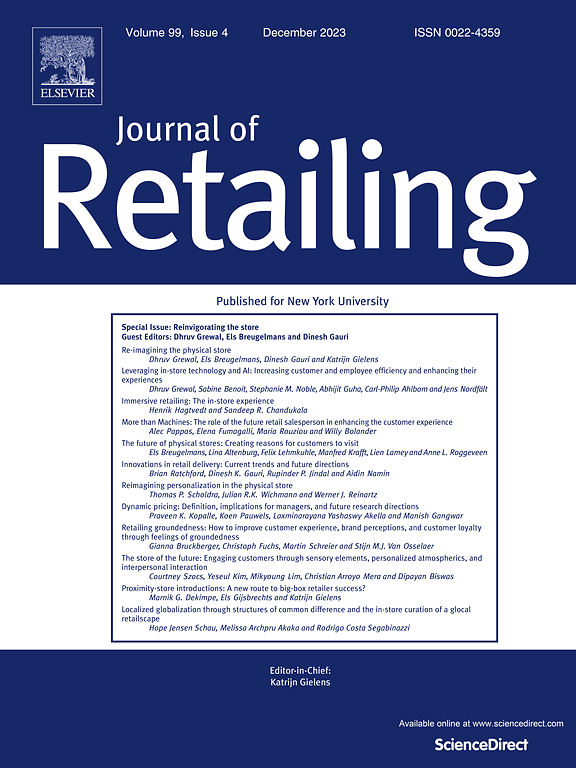Artificial intelligence versus human service agents: How their presence shapes consumer information privacy concerns
IF 10.2
1区 管理学
Q1 BUSINESS
引用次数: 0
Abstract
Service agents act on behalf of retailers to interact with consumers. Agents’ service delivery requires information from consumers, which may raise consumers’ concerns about their information privacy. While previous research has linked service agents’ presence to perceptions of being watched, little is known about how artificial intelligence (AI) (vs. human) agents’ passive or mere presence affects consumer information privacy concerns—a gap this research aims to address. In a series of experimental studies and drawing on reactance theory, we find that consumers express lesser privacy concerns in the presence of AI (vs. human) service agents, which in turn leads to a greater willingness to share personal information and increased intention to engage with the retailer. To explain this effect, we identify consumers’ perceptions of service agents’ power: consumers perceive AI (vs. human) agents as having less power over them and therefore have lesser privacy concerns. The findings are consistent across various retailer types (e.g., florists, home décor, food, pharmacy) and diverse participant groups. In addition, we identify two boundary conditions of this effect: the trustworthiness of service agents and the timing of their presence (before or after a purchase). Understanding these elements can help retailers effectively manage privacy concerns and strategically determine the presence of different types of service agents.
人工智能与人工服务代理:它们的存在如何影响消费者信息隐私问题
服务代理代表零售商与消费者互动。代理商的服务提供需要消费者提供信息,这可能会引起消费者对其信息隐私的担忧。虽然之前的研究将服务代理的存在与被监视的感觉联系起来,但对于人工智能(AI)代理的被动或仅仅存在如何影响消费者的信息隐私关注,我们知之甚少,这是本研究旨在解决的一个空白。在一系列的实验研究和利用抗拒理论中,我们发现消费者在人工智能(相对于人类)服务代理的存在下表达的隐私担忧较少,这反过来又导致了更大的分享个人信息的意愿,并增加了与零售商互动的意愿。为了解释这种影响,我们确定了消费者对服务代理权力的看法:消费者认为人工智能(相对于人类)代理对他们的权力较小,因此对隐私的担忧较少。调查结果在不同类型的零售商(如花店、家庭用品、食品、药房)和不同的参与者群体中都是一致的。此外,我们确定了这种效应的两个边界条件:服务代理的可信度和他们出现的时间(在购买之前或之后)。了解这些因素可以帮助零售商有效地管理隐私问题,并战略性地确定不同类型服务代理的存在。
本文章由计算机程序翻译,如有差异,请以英文原文为准。
求助全文
约1分钟内获得全文
求助全文
来源期刊

Journal of Retailing
BUSINESS-
CiteScore
15.90
自引率
6.00%
发文量
54
审稿时长
67 days
期刊介绍:
The focus of The Journal of Retailing is to advance knowledge and its practical application in the field of retailing. This includes various aspects such as retail management, evolution, and current theories. The journal covers both products and services in retail, supply chains and distribution channels that serve retailers, relationships between retailers and supply chain members, and direct marketing as well as emerging electronic markets for households. Articles published in the journal may take an economic or behavioral approach, but all are based on rigorous analysis and a deep understanding of relevant theories and existing literature. Empirical research follows the scientific method, employing modern sampling procedures and statistical analysis.
 求助内容:
求助内容: 应助结果提醒方式:
应助结果提醒方式:


